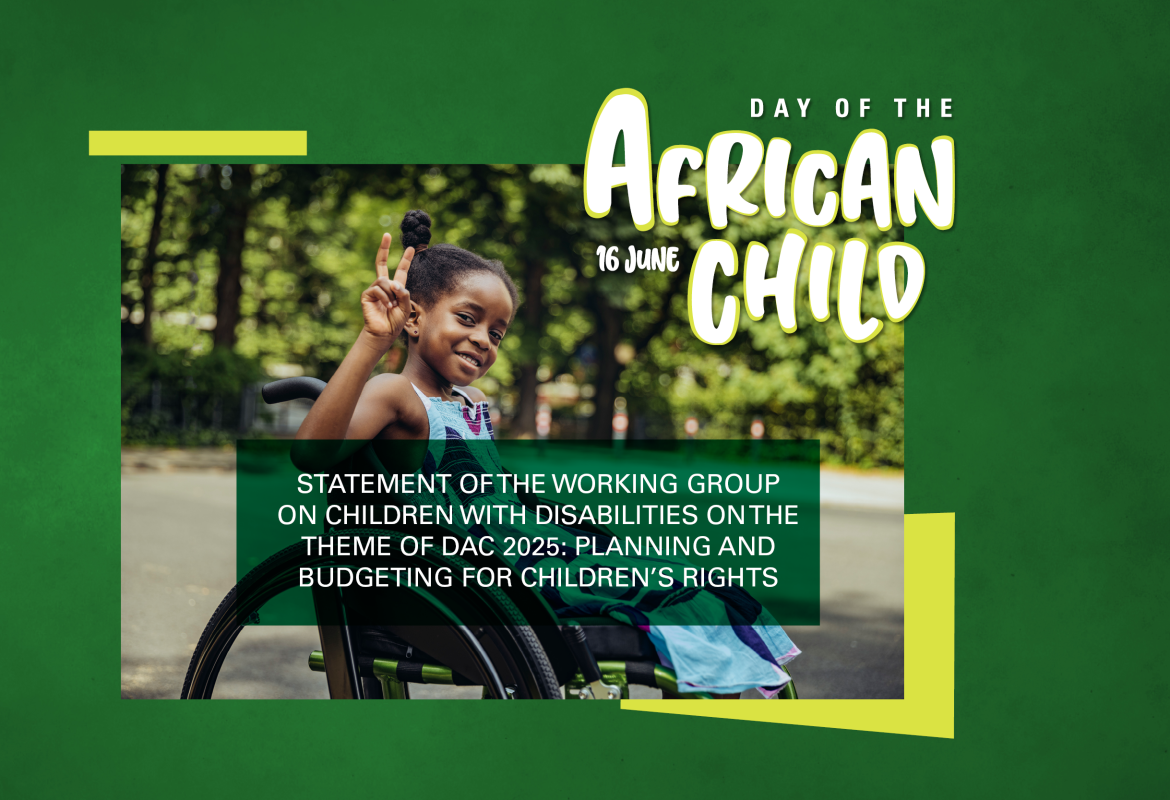Statement of the Working Group on Children with Disabilities of the African Committee of Experts on the Rights and Welfare of the Child
On the theme of the Day of the African Child 2025- Planning and Budgeting for Children’s Rights
A Call for Greater Investments for Children With Disabilities
There is an estimated 90 million children with disabilities in Africa. According to UNICEF data, an estimated 29 million of these live in Eastern and Southern Africa; 41.1 million in West and Central Africa; and 21 million in North Africa and the Middle East. Despite being a significant demography, children with disabilities are discriminated; excluded from essential health and education services; and deprived of opportunities for play, recreation, and community interactions, among other violations. Numerous factors explain this sad state of affairs, including prejudicial attitudes; discriminatory legal and budgetary practices; and neglect in public investment decisions.
Resource investment is essential for the implementation of children’s rights. Failure to make such invest undermines the rights and welfare of children. It is against this background that the African Committee of Experts on the Rights and Welfare of the Child dedicated the theme of the Day of the African Child 2025 to Planning and budgeting for children's rights: progress since 2010. While recognising that failure to plan and budget appropriately affects all children, the Working Group on Children with Disabilities emphasises that children with disabilities are the most neglected in public investment decisions.
The right of children with disabilities to benefit from public investments and the obligation of States to make those investments is enshrined in international and regional child rights instruments namely Article 7(1) and 4(2) of the Convention on the Rights of Persons with Disabilities (CRPD); Article 1 and 13 of the African Charter on the Rights and Welfare of the Child (ACRWC); and Article 4(i) of African Disability Protocol.
Despite these entitlements, public investments have not prioritized sectors benefiting children with disabilities, leading to low level of access to services and facilities, and consequently, poor wellbeing outcomes. From lack of access to immunization and basic healthcare services, to near-complete exclusion from sexual and reproductive health rights, from very low level of access to education, including early childhood education, to near-total exclusion from sociocultural interactions, including play and recreation, children with disabilities are routinely denied of their rights. The poor wellbeing outcomes of children with disabilities cut across sectors, as highlighted below:
In many countries in Africa, children with disabilities are 49% more likely to have never attended school than other children.
Even once in school, children with disabilities are 42% less likely to have foundational reading and numeracy skills, 41% more likely to experience discrimination, and 20% less likely to have expectations of a better life.
Children with disabilities are three times more likely to be denied access to any health care services and four times more likely to be treated poorly in the health care system.
In many countries, children with disabilities have no or very little access to sports and recreational facilities, as high as six in ten in some countries, because of accessibility challenges.
Many children with disabilities lead a life subjected to physical, emotional and sexual abuse and exploitation, including online sexual exploitation.
Considering these, and leveraging the theme and commemoration of this year’s Day of the African Child, the Working Group on Children with Disabilities calls upon State Parties and other stakeholders to:
- Ensure availability of up-to-date and disaggregated disability specific data to inform planning
Place children with disabilities at the centre of socioeconomic policymaking, taking steps to develop an attitude and practice that prioritises them in economic policy making and budgetary practices
Strive to increase the national resource envelope dedicated for children with disabilities through modernizing the tax systems, prioritising programs for children with disabilities in official development assistance, and identifying other resource mobilisation avenues
- Facilitate the participation of children with disabilities in the planning and budgeting processes
Increase budget allocations for ensuring the disability-accessibility of the built environment, products, services and facilities, including by investing in measures progressively leading to universal design
Direct public investments towards disability-inclusive child health, including for undertaking early detection and corresponding interventions, for rehabilitation, including for providing assistive and adaptive devices and aids, and for making sexual and reproductive health and information available, accessible and affordable
Make greater investments in the education of children with disabilities towards addressing the stark educational inequity and inequality faced by children with disabilities at various levels including at early childhood, primary and secondary education levels
Invest in community inclusion of children with disabilities, including through allocating increased budgets for their participation in play, cultural, recreational and religious activities including for renovation of existing facilities to ensure accessibility for children with disabilities
Implement social protection programmes (involving both in-kind and cash transfers) targeting children with disabilities and/or their families
Make investments in public awareness programmes targeted at all stakeholders including public finance decision makers to fight stigma and discrimination against children with disabilities and their families towards changing prevalent attitudes of de-prioritising children with disabilities in budgetary decisions
Adopt a multi-sectoral approach and nurture cross-sectoral synergies and coordination across ministries towards mainstreaming children with disabilities within sectoral investment priorities
Establish participatory approach for planning, budgeting, and evaluation of public expenditure by involving all stakeholders including organisations of persons with disabilities, CSOs
- Ensure that budget reporting processes take stock of disability specific commitments and respective measures and include this information in State Party reports to the ACERWC.
Let us unite our efforts to priorities and factor the needs of children with disabilities in public investment!







